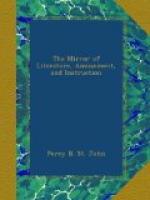the manner of the maid-servant, who looked like a man
disguised; and he felt a very unpleasant emotion.
This feeling was strengthened by a similar deportment
in the mistress of the house, who soon after entered
his room, and asked him if he wanted anything before
he retired to rest: disliking her manner, he soon
dismissed her, and went to bed, but the disagreeable
impression made on his mind by the maid and mistress,
kept him long awake; at length, however, he fell asleep.
During his sleep he dreamed that the corpse of a gentleman,
who had been murdered, was deposited in the cellar
of the house. This dream co-operating with the
unfavourable, or rather repulsive countenances and
demeanour of the two women, precluded all hopes of
renewed sleep, and it being the summer season, he
arose about five o’clock in the morning, took
his hat, and resolved to quit a house of such alarm
and terror. To his surprise, as he was leaving
it, he met the mistress in the entry, dressed, as
if she had never gone to bed. She seemed to be
much agitated, and inquired his reason for wishing
to go out so early in the morning. He hesitated
a moment with increased alarm, and then told her that
he expected a friend, who was to arrive by a stage
in Bishopsgate-street, and that he was going to meet
him. He was suffered to go out of the house,
and when revived by the open air, he felt, as he afterwards
declared, as if relieved from impending destruction.
He stated that in a few hours after, he returned with
a friend to whom he had told his dream, and the impression
made on him by the maid and the mistress; he, however,
only laughed at him for his superstitious terrors,
but on entering the house, they found that it was deserted,
and calling in a gentleman who was accidentally passing,
they all descended to the cellar, and actually found
a corpse in the state which the gentleman’s
dream had represented.
Drawing an Inference.
Dr. Monsey, with two or three old members of the university,
in the course of an evening walk, differed about a
proper definition of man. While they were severally
offering their notions on the subject, they came to
a wall where an itinerant artist had drawn various
representations of animals, ships, &c. After complimenting
him on his skill, one of the gentlemen asked him if
he could draw an inference. “No,”
said the artist, “I never saw one.”
Logic then gave way to jocularity, and a man coming
by with a fine team of horses, they stopped him, spoke
highly of the condition of his horses, particularly
admiring the first. “That horse, carter,”
said another of the gentlemen, “seems to be
a very strong one, I suppose he could draw a butt,”
The man assented. “Do you think he could
draw an inference?"—“Why,”
said the man, “he can draw anything in reason.”
“There,” said Monsey, “what becomes
of your definition, when you met a man that could not
draw an inference and a horse that could?”




